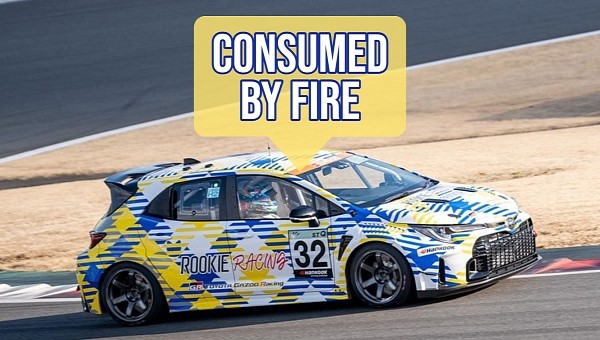Toyota started experimenting with hydrogen-powered combustion engines in 2021 and said it would test the concept on the racetrack. Fast forward to today, and Toyota's hydrogen racer, burning liquid hydrogen, was engulfed in flames after a leak in a hydrogen fuel line. Toyota calls it a minor setback that had nothing to do with the fuel but rather the car's engineering.
Many people want to believe that electric vehicles are just a stop-gap until a better solution for the combustion engine works. That "better solution" is often thought to be hydrogen, although there are still many issues with hydrogen-burning engines. Toyota probably wants the hydrogen to work the most, considering how invested it is in this propulsion system. The Japanese carmaker has tested several hydrogen solutions, from fuel cells to combustion engines running gaseous and now liquid hydrogen.
In 2021, Toyota entered a hydrogen-powered Corolla GR in Japan's Super Taikyu Series to test the propulsion system in racing conditions. Toyota started using high-pressure gaseous hydrogen as fuel, which presents several disadvantages. Among them is that the gas must be stored in high-pressure tanks, usually made of expensive carbon fiber. This also means that fuel stations need to be able to boost the pressure. Gaseous hydrogen is also less energy dense than liquid hydrogen.
Liquid hydrogen has many advantages but also one major drawback: it must be cooled at minus 423 F (-253 C) to stay in liquid form. This is why liquid hydrogen is almost impossible to use in commercial cars. In racetrack conditions, the time needed to burn the fuel is too short for the hydrogen to evaporate and cause trouble. Based on these facts, Toyota modified the Corolla race car to use liquid hydrogen and, in February, began testing the new system. Things were looking good, and the hydrogen-powered racer was set to debut in the Super Taikyu Series 2023 next weekend.
Unfortunately, the car experienced a fuel leak during a testing session on March 8, causing a major fire. Nobody was hurt, but the Corolla was unrecoverable and won't make it to the competition's start. Toyota tried to keep this event under the radar, but as people noticed the car was not signed up for the series start on March 18, it had to offer explanations. This happened one full week after the incident.
According to Toyota's press release, the fire occurred due to a hydrogen leak from a gaseous hydrogen pipe in the engine compartment. Toyota assures us that the fire was not directly caused by the fuel change from gaseous hydrogen to liquid hydrogen. Instead, the Japanese carmaker blames the incident on the loosening of a piping joint from vehicle vibration, resulting in a hydrogen leak. As the piping joint is located near the engine, the leaked hydrogen ignited.
Toyota also said that the hydrogen leak sensor fail-safe functioned properly, so the hydrogen supply was shut off. As a result, the cabin was protected, and the safety measures for the occupants worked as intended. The carmaker will review the piping design that caused the leak and try to continue the hydrogen-powered car's racing career.
In 2021, Toyota entered a hydrogen-powered Corolla GR in Japan's Super Taikyu Series to test the propulsion system in racing conditions. Toyota started using high-pressure gaseous hydrogen as fuel, which presents several disadvantages. Among them is that the gas must be stored in high-pressure tanks, usually made of expensive carbon fiber. This also means that fuel stations need to be able to boost the pressure. Gaseous hydrogen is also less energy dense than liquid hydrogen.
Liquid hydrogen has many advantages but also one major drawback: it must be cooled at minus 423 F (-253 C) to stay in liquid form. This is why liquid hydrogen is almost impossible to use in commercial cars. In racetrack conditions, the time needed to burn the fuel is too short for the hydrogen to evaporate and cause trouble. Based on these facts, Toyota modified the Corolla race car to use liquid hydrogen and, in February, began testing the new system. Things were looking good, and the hydrogen-powered racer was set to debut in the Super Taikyu Series 2023 next weekend.
Unfortunately, the car experienced a fuel leak during a testing session on March 8, causing a major fire. Nobody was hurt, but the Corolla was unrecoverable and won't make it to the competition's start. Toyota tried to keep this event under the radar, but as people noticed the car was not signed up for the series start on March 18, it had to offer explanations. This happened one full week after the incident.
According to Toyota's press release, the fire occurred due to a hydrogen leak from a gaseous hydrogen pipe in the engine compartment. Toyota assures us that the fire was not directly caused by the fuel change from gaseous hydrogen to liquid hydrogen. Instead, the Japanese carmaker blames the incident on the loosening of a piping joint from vehicle vibration, resulting in a hydrogen leak. As the piping joint is located near the engine, the leaked hydrogen ignited.
Toyota also said that the hydrogen leak sensor fail-safe functioned properly, so the hydrogen supply was shut off. As a result, the cabin was protected, and the safety measures for the occupants worked as intended. The carmaker will review the piping design that caused the leak and try to continue the hydrogen-powered car's racing career.













